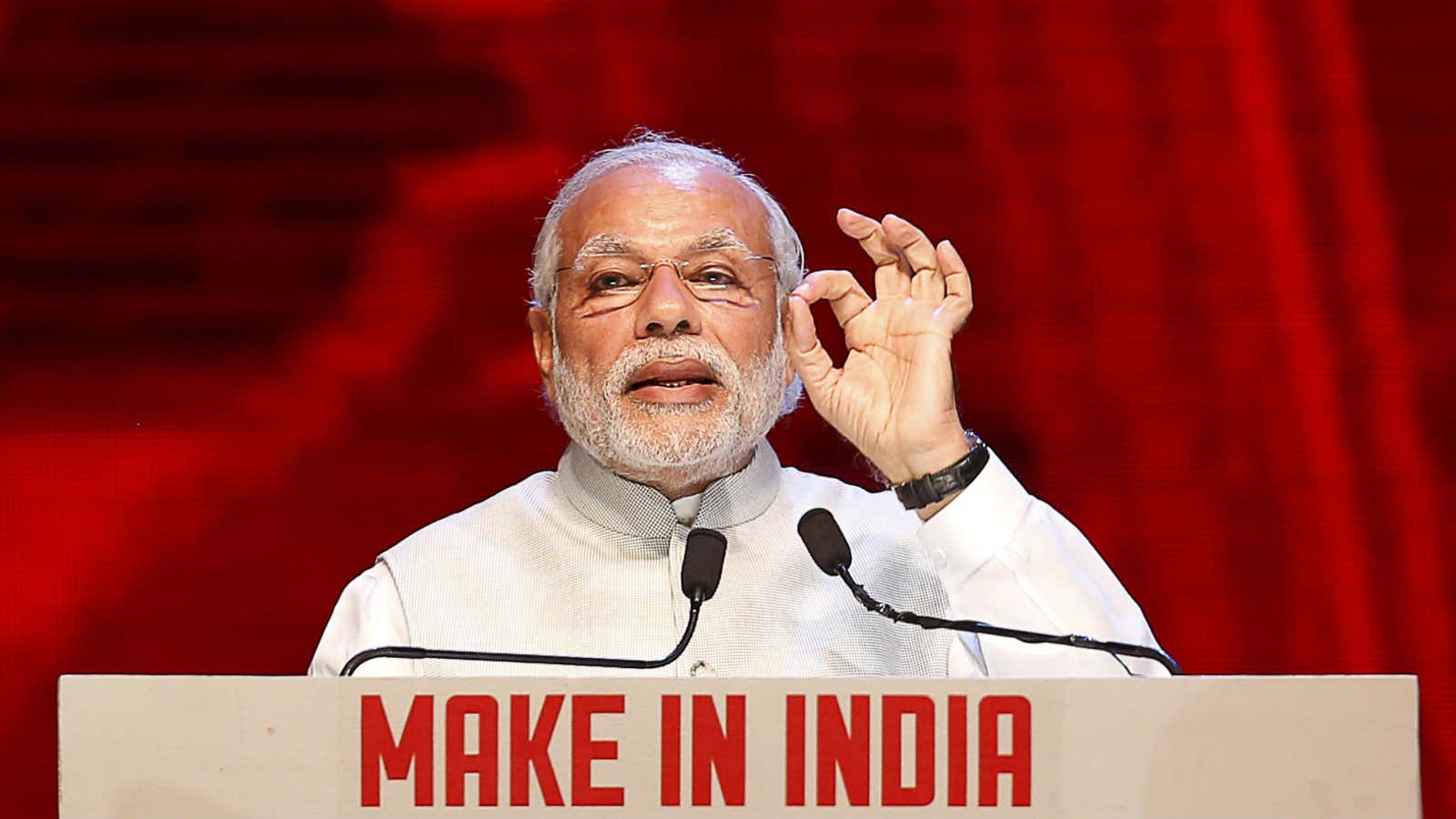India’s economic growth has been talked about a lot in recent months. Asia’s third largest economy is one of the world’s fastest growing—estimated over 7.5% annually.
Several economists feel that there is a bit of good luck involved in this stellar performance. For one, falling global oil prices are said to have played a major role in the current growth. India imports most of its crude. Some bit of statistical jugglery when it comes to GDP calculation has also helped.
However, Modi disagrees.
In a combative rebuttal to criticism of the growth figures, Modi denied that good luck had favoured India. ”This is the result of good policy, not good fortune,” Modi said on March 28 at the Bloomberg India Economic Forum 2016, held in New Delhi.
“For India to be at the top of global growth tables is an unusual situation. Obviously, there are some who find that difficult to digest and come up with imaginative and fanciful ideas to belittle that achievement. The fact is that India’s economic success is the hard-won result of prudence, sound policy and effective management,” he added.
Here are some excerpts from his speech, in which he explained his stance:
On oil prices
Between 2008 and 2009, crude oil prices fell steeply from a peak of $147 per barrel to less than $50. This was a steeper fall than between 2014 and 2015. Yet in 2009-10, India’s fiscal deficit, its current account deficit and its inflation rate, all got substantially worse. And this slide was from a higher base figure for all three. But in 2015-16, all three have improved, from a lower base. Many other emerging economies also depend on imported oil. If oil prices were the driver of success, those countries would all be showing similar results. But they are not.
On monsoons and drought
We have not been lucky with monsoons or weather. 2015 and 2014 have both been drought years. Drought was compounded by unseasonal hail storms. Yet foodgrain production has remained much higher, and inflation much lower, than in the last comparable drought year, which was 2009-10.
On fiscal consolidation
We have met ambitious fiscal targets in each of the previous two fiscal years. We have reduced the deficit even while increasing capital expenditure. And the reduction has come despite an unprecedented steep cut in the centre’s share of tax revenues, in the award of the fourteenth Finance Commission. For 2016-17, we have targeted a fiscal deficit of 3.5% of GDP. This will be the second lowest level in the last 40 years.
“Feel” the growth rate
Modi has also been criticised for not sticking to his promise of “big bang” economic reforms, a key agenda in the run up to his election. Many new bills and tax reform measures, for instance, are stuck as the ruling and opposition parties continue to squabble. Critics say this has hampered on-ground economic growth, which is not as phenomenal as the numbers show.
“There are some who remain confused and have said that the growth rate does not ‘feel’ right. Perhaps I can be of some assistance to them in reducing the confusion, by stating facts in place of feelings,” Modi said.
He spoke of how corporate financial health has improved.
“In 2013 and 2014, the number of firms whose credit rating was downgraded was much higher than those who were upgraded. That has now changed decisively. Upgrades are up and downgrades are down. In the first half of fiscal year 2015-16, for every company getting a downgrade, there were more than two companies which received upgrades, the best level in recent years,” he said.
Modi added that the stress among few highly leveraged firms had “influenced media perceptions.” He said foreign direct investments had gone up, and motor vehicle and apparel production increased.
He also spoke about the massive plans his government had for rural India, initiatives such as Startup India, policies for job creation and tax reforms among others.
Ending his speech with trademark oratory, Modi said, ”What we have achieved so far, gives me the confidence that, with the support of the people, we can transform India. I know it will be difficult. But I am sure it is do-able. And I am confident, it will be done.”
